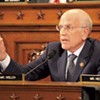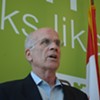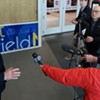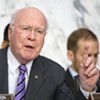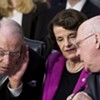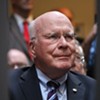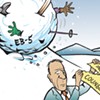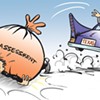Switch to the mobile version of this page.
Vermont's Independent Voice
- News
- Arts+Culture
- Home+Design
- Food
- Cannabis
- Music
- On Screen
- Events
- Jobs
- Obituaries
- Classifieds
- Personals
Browse News
Departments
-
Education

Scott Official Pushes Back on Former State…
-
News

Burlington Budget Deficit Balloons to $13.1 Million
-
Education

Senate Committee Votes 3-2 to Recommend Saunders…
- Court Rejects Roxbury's Request to Block School Budget Vote Education 0
- Norwich University Names New President Education 0
- Media Note: Mitch Wertlieb Named Host of 'Vermont This Week' Health Care 0
Browse Arts + Culture
View All
local resources
Browse Food + Drink
View All
Browse Cannabis
View All
-
Culture

'Cannasations' Podcaster Kris Brown Aims to 'Humanize'…
-
True 802

A Burlington Cannabis Shop Plans to Host…
-
Business

Judge Tosses Burlington Cannabiz Owner's Lawsuit
-
Health + Fitness

Vermont's Cannabis Nurse Hotline Answers Health Questions…
-
Business

Waterbury Couple Buy Rare Vermont Cannabis License
Browse Music
View All
Browse On Screen
Browse Events
Browse Classifieds
Browse Personals
-

If you're looking for "I Spys," dating or LTRs, this is your scene.
View Profiles
Special Reports
Pubs+More
The 'I' Word: Why Welch, Leahy and Sanders Aren't Ready to Impeach
Published August 29, 2018 at 10:00 a.m. | Updated November 19, 2019 at 8:49 p.m.
Fair Game is Seven Days’ weekly political column.
click to enlarge 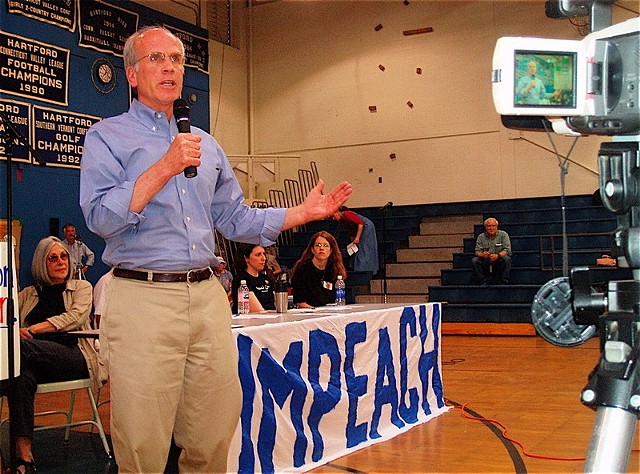

- File: Peter Freyne
- U.S. Rep. Peter Welch addresses supporters of impeaching President George W. Bush at a May 2007 meeting at Hartford High School.
For more than two and a half hours, progressive protesters harangued U.S. Rep. Peter Welch (D-Vt.) in the Hartford High School gymnasium, imploring him to file articles of impeachment against the president of the United States.
One by one, many in the crowd of 250 took a turn at the microphone, arguing in favor of impeachment and against Welch, whom they accused of ducking his constitutional responsibility to hold the president accountable. One displayed a sign that read: "Welch, the wizard of pause."
But the politician remained unbowed in the front row of his own town hall meeting. "Impeachment, I believe, is the wrong tactic," Welch responded.
The year was 2007, and the president in question was not Donald Trump but George W. Bush. Welch, who had won election to Congress months earlier on a pledge to end the Iraq War, was facing his first major test in office. I was a 23-year-old reporter at the Brattleboro Reformer, covering the Windham County activists behind the drive to impeach Bush for waging what they called an illegal war.
"It was a whole lot of baloney, because he didn't answer any of our questions," Kurt Daims, a gray-bearded, beret-wearing Brattleboro resident complained as we departed the Hartford High gym.
I've thought often about that meeting in the 15 months since Trump fired Federal Bureau of Investigation director James Comey in an act of — as the president essentially admitted on national television — obstruction of justice. If the Vermont left was so keen on impeaching the 43rd president of the United States, why hasn't it mobilized around impeaching the 45th?
Daims, who went on to author a Town Meeting Day resolution to arrest Bush and then-vice president Dick Cheney if they stepped foot in Brattleboro, has wondered the same thing. His fellow activists, he said with regret, are "not in a hurry" to impeach Trump.
Eleven years after facing down the anti-Bush crowd, Welch sounds much the same. He deplores the incumbent president but opposes impeachment on tactical grounds — at least, for now.
"I think Donald Trump is the worst president in my lifetime — probably the worst president in history," he said. But, Welch continued, "The question of whether he crossed the line legally is a prosecutorial question." And until Special Counsel Robert Mueller completes his investigation into allegations that Trump conspired with Russia to swing the 2016 election and then obstructed justice to cover it up, Welch thinks it would be a mistake to pursue removal from office.
"In order to have an impeachment, there has to be a credible investigation," Welch said. That requires "restraint on the part of those of us in Congress" who might eventually vote to impeach, he added.
Welch's comments came less than a week after Trump's former campaign chair, Paul Manafort, was convicted on a variety of bank and tax fraud charges and Trump's longtime lawyer, Michael Cohen, pleaded guilty to making illegal payments to prevent two women from revealing alleged affairs with the president. In a breathtaking appearance in a Manhattan federal court, Cohen testified under oath that he'd made those payments "in coordination with and at the direction of" the future president.
But even as the walls close in around Trump, Welch remains strangely averse to calling out what is clearly illegal behavior. Asked repeatedly whether the president had broken the law, Welch would only go so far as to say, "It definitely appears that he was involved in a campaign finance violation."
Involved in a campaign finance violation? I'd argue that (allegedly!) conspiring with your fixer on the eve of a presidential election to illegally funnel hush money to your mistresses — and then lying about it — qualifies as a bit more than that.
Welch's colleagues in Vermont's congressional delegation appear just as hesitant to call a crime a crime. Speaking on the Senate floor last week, Sen. Patrick Leahy (D-Vt.) noted that Cohen had effectively identified Trump as "an unindicted co-conspirator." But in an interview moments later with Seven Days, he only begrudgingly admitted that Trump had broken the law.
"It appears he has," Leahy said. "We'll let that determination be made by Mr. Mueller."
The third member of the delegation, Sen. Bernie Sanders (I-Vt.), declined requests for an interview over the course of a week. In a written statement, he referred to Manafort's conviction and Cohen's plea only as "a serious development."
Why the tepid reaction, particularly from three pols with plenty of political capital? Admitting that the president committed a crime requires more than a five-sentence press release or even a Senate floor speech. If (allegedly!) conspiring to break the law in order to swing an election qualifies as a "high crime or misdemeanor" — and plenty of legal scholars think it does — then the appropriate remedy would be impeachment. Congress would be duty-bound to take action. Now.
The Vermont delegation has two truly compelling reasons to keep its powder dry.
First, Democrats are poised to take back the House this fall, at which point they'll actually have the power to impeach. Why blow it by turning the 2018 election into a referendum on the matter? "I mean, the House is not going to do anything on impeachment [now], anyway," Leahy noted.
Second, the bread crumbs Mueller's been leaving in federal court filings suggest he's got a lot more on Trump than a six-figure payment to Stormy Daniels. "That's the big question pending out there," Welch said. "Was there collusion between the president, the president's campaign and the Russians in the interference of the election?"
There's another, more parochial reason the delegation is avoiding the impeachment debate: Vermonters, for all their anti-Trump fervor, don't seem to be clamoring for it — and even the most radical activists are approaching the question in an unusually restrained and strategic manner.
"I don't see why we aren't just waiting until Mueller finishes," said Dan DeWalt, the firebrand Newfane cabinetmaker who launched the Bush impeachment movement in 2006. "At this point, I think it would be silly, and it would not work. We need to focus on things we can actually do."
Even the progressive political groups one might expect to lead the charge are holding their fire. Vermont- and New Hampshire-based Rights & Democracy has yet to take a position on impeachment, according to spokesperson Shay Totten. Rather, he said, the organization's members are focused on "resisting Trump's policies."
Totten, who covered the Bush impeachment movement for the now-defunct news site Vermont Guardian, cautions against equating the dearth of an impeachment movement with an acceptance of Trump. "To be perfectly honest, I think we're seeing more ire now than at any time Bush was in office," he said, noting that tens of thousands of Vermonters have participated in anti-Trump marches and rallies. "People are pissed. People are really pissed."
At least one local organization is ready to take action if Trump crosses the ultimate red line of firing Deputy Attorney General Rod Rosenstein in order to shut down the Mueller probe. The Burlington-based Peace & Justice Center has been coordinating with the national advocacy group MoveOn.org to organize emergency "Nobody Is Above the Law" rallies throughout the state if Trump fires Rosenstein or pardons key witnesses. Some 900 Vermonters have RSVPed, according to PJC executive director Rachel Siegel.
"If they're not held accountable, it's really dangerous in terms of what it might mean for everybody else in the country," she said of the Trump administration. "What else will we let people get away with?"
Though Welch said firing Rosenstein would be an impeachable offense, he wouldn't say the same about pardoning Manafort. "I don't want to go into your hypotheticals one after another," he said, getting a little snippy. "Obstruction of justice is the line he cannot cross."
But didn't Trump cross that line a long time ago, when he fired Comey? Welch paused for moment. "We need to know what the basis was of his firing Comey, and that's part of the investigation that Mueller is doing," he said.
Though Leahy has cosponsored legislation to protect the Mueller probe, he has for months refused to say what he'd actually do if Trump ended it. "I'm not going to go into what-ifs, what-ifs, what-ifs," Leahy said last week.
But it's a dangerous hypothetical we know Trump has pondered. And as soon as the president steps over that red line, there's no going back.
The Vermont delegation's cautious approach might be sensible and wise. But there could soon come a time when Congress requires the sort of leadership that Vermont has occasionally provided — such as in 1954, when Republican senator Ralph Flanders moved to censure his red-baiting colleague, Joseph McCarthy.
Sometimes, it's more important to be principled than practical or tactical.
Media Notes
For the past three years, Middlebury-based Vermont Coffee Company has spent at least $10,000 a year underwriting Vermont Public Radio programming. (To the uninitiated, "underwriting" is a euphemism for "advertising" in Public Broadcasting Land, where traditional ads are barred by the Federal Communications Commission.)
So the company's chief executive officer, Paul Ralston, was taken aback this month when he received an email from VPR director of corporate support Lesli Blount informing him that the station would not run its ads — ahem, underwriting — for 30 days prior to this November's election.
Ralston, you see, recently entered the race for one of Addison County's two seats in the state Senate. According to Blount, a listener query had resulted in "a recent policy decision" barring preelection underwriting from companies "when the owner is running for office and is closely aligned with the identity of the business."
Ralston cried foul and appealed to VPR's new president and CEO, Scott Finn. But the station would not budge, offering only to run the spots after the election or refund a portion of the company's $22,328 contribution. The company chose the latter.
"I'm trying to figure out what I did wrong here," Ralston said. "It just seems a little arbitrary to me."
Finn, who declined to discuss VPR's dealings with a specific underwriter, conceded that he's never eager to turn down a contribution. But he noted that FCC rules also bar public broadcasters from running political ads.
"At the end of the day, we'd rather err on the side of caution," he said. "We're trying to be as fair and ethical and unbiased as possible, regardless of the cost."
According to Finn, VPR's policy is long-standing, despite what Blount said in her email. Indeed, when Milne Travel president Scott Milne ran for governor in 2014 and U.S. senator in 2016, VPR yanked the company's spots.
"I think there's an argument that it's a reasonable policy, but it should be thought through and standardized so it's applied uniformly," Milne said. "What happens when [Green Mountain Power CEO] Mary Powell runs for something? Are we not going to say 'Green Mountain Power'? It's a slippery slope."
Finn acknowledged that it's not easy to measure the association of a candidate with his or her business. Ultimately, his leadership team has to make the call.
Ralston believes that, in this case, VPR made the wrong one.
"Ben & Jerry's, you'd get. But I don't get Vermont Coffee Company," the candidate said. "I don't know that people say, 'That bag of coffee means Paul Ralston.'"
Disclosure: Paul Heintz worked as Peter Welch's communications director from November 2008 to March 2011.
John Walters will return next week.
Related Stories
Got something to say?
Send a letter to the editor
and we'll publish your feedback in print!
Tags: Fair Game, Peter Welch, Donald Trump, impeachment, Robert Mueller, Vermont Public Radio, Vermont Coffee Company
More By This Author
About The Author

Paul Heintz
Bio:
Paul Heintz was part of the Seven Days news team from 2012 to 2020. He served as political editor and wrote the "Fair Game" political column before becoming a staff writer.
Paul Heintz was part of the Seven Days news team from 2012 to 2020. He served as political editor and wrote the "Fair Game" political column before becoming a staff writer.
About the Artist

James Buck
Bio:
James Buck is a multimedia journalist for Seven Days.
James Buck is a multimedia journalist for Seven Days.
Speaking of...
-

Welch Pledges Support for Nonprofit Theaters
Apr 25, 2024 -

Haley Scores Win Over Trump in Vermont
Mar 5, 2024 -

Nikki Haley Plans Campaign Stop in Vermont on March 3
Feb 26, 2024 -

Scott Calls on New Hampshire Primary Voters to 'Stop Trump'
Jan 19, 2024 -

Defiant Franklin County Sheriff Blasts Media, Lawmakers
Dec 11, 2023 - More »
Comments (7)
Showing 1-7 of 7
Comments are closed.
From 2014-2020, Seven Days allowed readers to comment on all stories posted on our website. While we've appreciated the suggestions and insights, right now Seven Days is prioritizing our core mission — producing high-quality, responsible local journalism — over moderating online debates between readers.
To criticize, correct or praise our reporting, please send us a letter to the editor or send us a tip. We’ll check it out and report the results.
Online comments may return when we have better tech tools for managing them. Thanks for reading.
- 1. Scott Official Pushes Back on Former State Board of Ed Chair's Testimony Education
- 2. Burlington Budget Deficit Balloons to $13.1 Million News
- 3. Home Is Where the Target Is: Suburban SoBu Builds a Downtown Neighborhood Real Estate
- 4. A Former MMA Fighter Runs a Wildlife Rehabilitation Center in Cabot News
- 5. Legislature Advances Measures to Improve Vermont’s Response to Animal Cruelty Politics
- 6. Vermont Rep. Emilie Kornheiser Sees Raising Revenue as Part of Her Mission Politics
- 7. Senate Committee Votes 3-2 to Recommend Saunders as Education Secretary Education
- 1. Totally Transfixed: A Rare Eclipse on a Bluebird Day Dazzled Crowds in Northern Vermont 2024 Solar Eclipse
- 2. Zoie Saunders, Gov. Scott’s Pick for Education Secretary, Faces Questions About Her Qualifications Education
- 3. Don't Trash Those Solar Eclipse Glasses! Groups Collect Them to Be Reused 2024 Solar Eclipse
- 4. State Will Build Secure Juvenile Treatment Center in Vergennes News
- 5. Vermont Awarded $62 Million in Federal Solar Incentives News
- 6. Queen of the City: Mulvaney-Stanak Sworn In as Burlington Mayor News
- 7. New Jersey Earthquake Is Felt in Vermont News

























